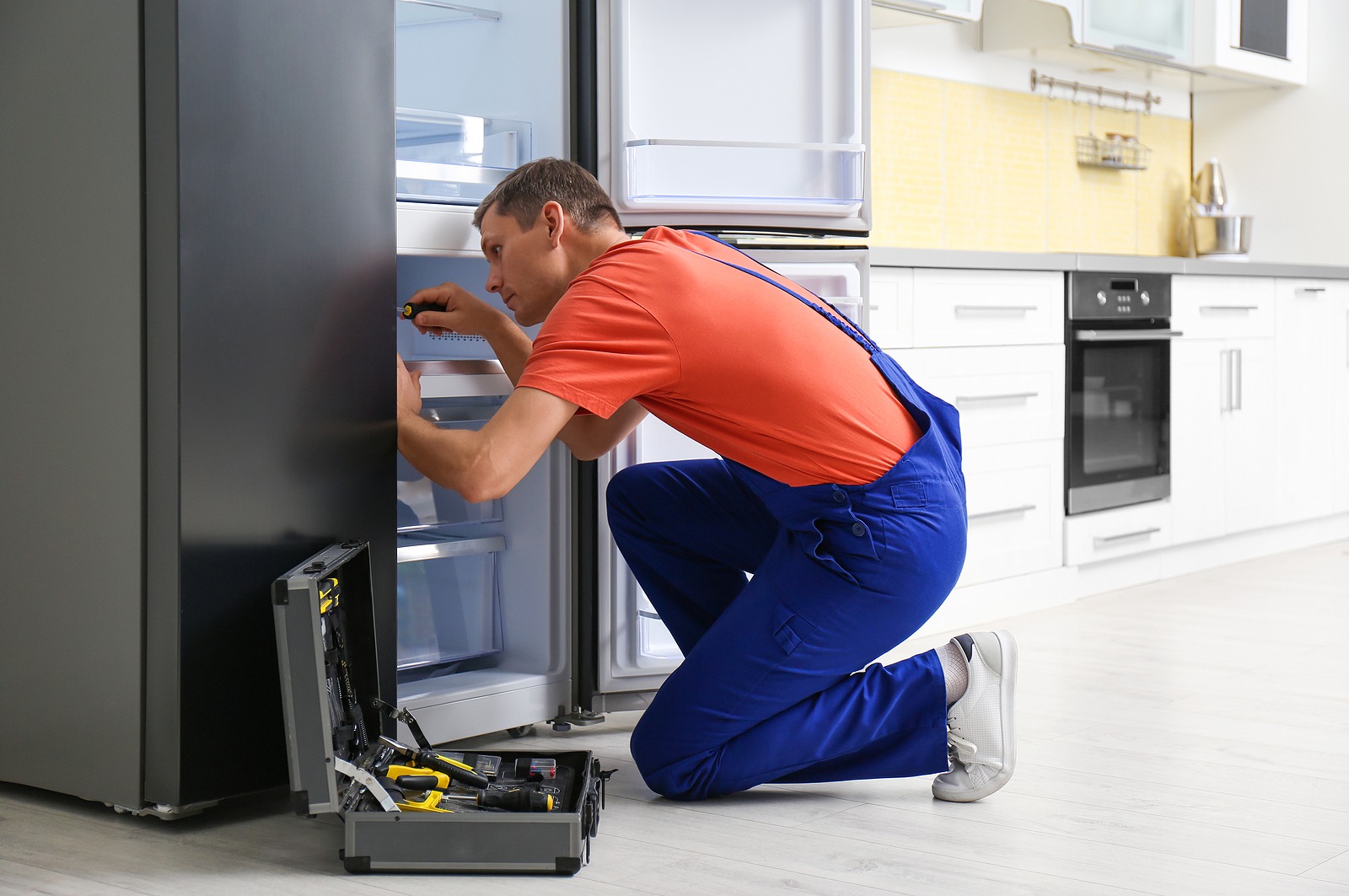The Ultimate Guide to Understanding Appliance Repair in your home
When your refrigerator quits cooling or your oven refuses to heat, it can really feel overwhelming. Understanding device repair work in your home can save you time and cash. You'll learn to identify symptoms, make use of crucial devices, and comply with a methodical troubleshooting procedure. Before you begin, there are essential safety preventative measures you require to take into account. What are the most typical issues, and how can you repair them? Allow's explore the basics.
Typical Device Issues and Their Signs
When your devices begin breaking down, it's necessary to identify the indications at an early stage. Overlooking them can cause bigger concerns and expensive repairs. If your fridge isn't cooling down correctly, you could notice cozy places or condensation forming. This could suggest a falling short compressor or a blocked vent.Your dishwasher might reveal problems through dirty recipes or unusual noises throughout cycles. If you listen to grinding or clanking, it's time to investigate.A washing equipment that will not spin or drain can leave you with soaked washing, suggesting a clogged drain or a malfunctioning pump.Lastly, if your oven's temperature level appears off or it takes permanently to preheat, you could be dealing with a faulty thermostat. By staying alert to these symptoms, you can address issues prior to they escalate into significant fixings.
Necessary Tools for Device Repair Service
When you're taking on appliance repair work in your home, having the right devices is important. Basic hand tools like screwdrivers and pliers will certainly assist you disassemble and fix different devices, while electric screening tools ensure you're working safely with electrical wiring. Let's look at what you need to start on your fixing journey.
Standard Hand Devices
Having the right devices is essential for efficient device repair work in the house. Start with a dependable screwdriver set, including both flathead and Phillips kinds, as screws are typical in home appliance setting up. Pliers are likewise essential; they aid with gripping, twisting, and cutting cords or little components. A set of needle-nose pliers can get to difficult situations easily. You'll need an excellent flexible wrench for tightening or loosening up nuts and screws. An energy blade comes in handy for reducing with packaging or insulation. Do not fail to remember a tough workbench or surface area to securely organize your devices and components. With these basic hand tools, you'll be well-prepared to tackle most device repairs that come your method.
Electrical Testing Instruments
Along with standard hand tools, electrical screening devices play a crucial duty in appliance repair. These tools aid you identify electrical problems and guarantee appliances operate safely. A multimeter is important; it gauges voltage, present, and resistance, permitting you to pinpoint problems promptly. A non-contact voltage tester is another must-have, letting you identify online cables without making straight call, boosting your safety. Clamp meters are fantastic for measuring current flow in cables without disconnecting them, conserving you effort and time. Additionally, circuit testers can promptly check if outlets are working properly. By making use of these gadgets, you'll simplify your troubleshooting procedure and boost your repair service skills, making home appliance upkeep a whole lot less complicated.
Step-by-Step Guide to Diagnosing Device Issues
When your device acts up, it can be frustrating, yet identifying the issue doesn't have to be frustrating. You'll discover to determine common problems and use efficient fixing methods. Allow's go through the actions to obtain your device back in functioning order.
Common Appliance Issues

Repairing Techniques Described

Fixing Major Kitchen Home Appliances: A Closer Look
Have you ever asked yourself exactly how to take on typical concerns with your kitchen home appliances? Repairing significant kitchen area home appliances like fridges, ovens, and dishwashing machines can be easier than you assume. Begin by recognizing the problem-- whether it's a fridge not cooling down or a stove that won't heat. Frequently, an easy reset or examining the power resource can fix the issue.For refrigerators, clean the condenser coils and check the door seals. If your oven's not heating, check the home heating element and thermostat. Dishwashing machines could just need a tidy filter or a reset to get them back at work. Constantly disconnect the home appliance prior to diving right into repair services to assure your safety.Don' t neglect to speak with the user guidebook for details troubleshooting pointers associated to your model. With a little patience and the right tools, you can with confidence take on device repair work and save cash in the process!

Fixing Laundry Devices: Tips and Techniques
When your washing home appliances begin breaking down, it can really feel overwhelming, however fixing them does not have to be a hassle. Beginning by inspecting the power supply. Confirm the device is plugged in and the outlet is functioning. Next off, evaluate the door or cover switch; a faulty button can avoid the machine from operating.For washers, if it's not spinning, inspect for out of balance lots. Redistributing the garments might resolve the issue. If your dryer isn't home heating, clean the dust filter and check the air vent for blockages.Listen for uncommon sounds; they can show a problem. If your home appliance is dripping, check the tubes for splits or loosened links. Record any type of mistake codes presented on digital screens, as they can guide you in recognizing the problem. Consult the individual guidebook for specific repairing pointers associated to your model.
Safety And Security Preventative Measures to Take Throughout Repairs
Before you start any home appliance repair services, it's vital to prioritize safety to avoid mishaps or injuries. First, unplug the home appliance or switch off the circuit breaker to guarantee no power reaches it while you function. Usage shielded tools to lessen the danger of electric shock. Wear safety and security goggles and gloves to shield on your own from sharp edges or debris (Fixes washers and dryers Oro valley Dependable Appliance Repair).Make certain your office is neat and well-lit, so you can see what you're doing. Keep kids and family pets far from the location to avoid diversions and possible threats. If you're handling gas appliances, be extra careful; check for leaks before proceeding.Take your time, and don't rush with repair services. If you really feel unclear about any type of action, it's much better to stop briefly and research study than to guess. Adhering to these preventative measures will help produce a much safer setting for your do it yourself device fixing project
When to Call a Specialist for Help
Just how do you know if it's time to call an expert for home appliance repairs? If you've attempted standard troubleshooting without success, it's a clear sign. If your appliance still will not begin or reveals unusual noises after resetting it, do not think twice to seek professional help.When you notice leakages, smoke, or burning scents, prioritize safety and call a pro right away. These problems can lead to more considerable damage or pose dangers to your home.Also, if your home appliance is under warranty, speaking to a specialist is frequently the very best path. They can guarantee that repair services won't void your warranty, conserving you money in the lengthy run.Finally, if you're unclear or uncomfortable with intricate repair services, it's sensible to leave it to the experts. Remember, dealing with complex problems without the best know-how can cause costly blunders. Trust a professional when unsure!
Regularly Asked Concerns
How Can I Avoid Home Appliance Problems in the Future?
To stop device problems in the future, you ought to do regular maintenance, check for damage, tidy filters, and prevent overloading. Remaining positive will aid expand their life-span and keep them running smoothly.
What Are the A Lot Of Typical DIY Device Repair Work Mistakes?
You could ignore safety preventative measures, miss troubleshooting steps, or utilize incorrect tools when trying do it yourself appliance repairs. Rushing the procedure or overlooking supplier guidelines can bring about more significant issues and pricey blunders. Stay individual and educated!
How Do I Know if a Part Demands Replacement?
You can tell if a part needs replacement by looking for uncommon noises, leakages, or inconsistent performance. If the home appliance battles to operate correctly or reveals visible damage, it's most likely time for a replacement.
Can I Utilize Generic Parts for Device Repair Works?
Yes, you can utilize generic components for home appliance repair work, however ascertain they work - Dryer repair Oro Valley Dependable Refrigeration & Appliance Repair Service. Common parts could conserve you cash, however they might impact efficiency or longevity, so evaluate your options meticulously prior to deciding
What Service Warranties Cover Appliance Fixes?
A lot of appliance guarantees cover repair services for manufacturing issues, yet they often leave out damages from abuse. Examine your service warranty terms very carefully, as some could require utilizing certified specialists and initial parts for protection to remain legitimate.